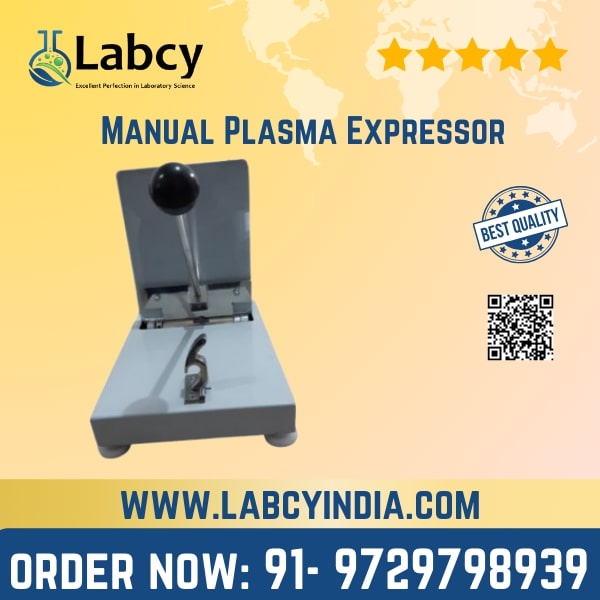Manual Plasma Expressor Manufacturers in Abidjan – Trusted Exporters & Suppliers
The Manual Plasma Expressor is an essential device for blood banks, transfusion centers, and clinical laboratories that require controlled, contamination-free separation of plasma from donor blood bags. Designed for ease-of-use, portability and reliability, manual plasma expressors are ideal for both fixed blood bank facilities and mobile donation drives. Labcy India is a leading name among Manual Plasma Expressor Manufacturers in Abidjan, providing robust, ergonomically designed units that meet clinical safety standards and facilitate efficient blood component preparation.

Why Choose Labcy India’s Manual Plasma Expressor?
When blood banks and hospitals search for dependable Manual Plasma Expressor Manufacturers in Abidjan, they look for proven build quality, smooth operation and easy maintenance. Labcy India combines medical-grade materials with user-centered design to deliver expressors that provide consistent, safe plasma expression without complex electronics — reducing failure points and maintenance downtime.
Key Features & Build Quality
- Medical-Grade Construction — Durable materials compatible with sterile environments and frequent disinfection.
- Ergonomic Manual Operation — Smooth hand-crank or lever-driven mechanism for precise control during plasma expression.
- Controlled Pressure Application — Prevents damage to tubing and blood bags while maximizing plasma yield.
- Compact & Portable — Lightweight design suitable for mobile camps and remote blood donation drives.
- Low Maintenance — Simple mechanical design with replaceable wear-parts for long-term serviceability.
- Hygiene-Focused Design — Easy-to-clean surfaces and minimal crevices where contaminants could accumulate.
Operation Modes & Models
- Lever-Operated Manual Expressors — Robust, high-leverage models for quick expression with minimal effort.
- Crank-Operated Bench Models — Precision control for clinical labs preparing multiple components.
- Portable Foldable Models — Designed for outreach programs and emergency response teams.
- Hybrid Manual-Assist Models — Manual primary operation with optional foot-assist or battery backup (where allowed).
Applications of Manual Plasma Expressors
- Blood banks & transfusion centers
- Hospital blood component preparation units
- Mobile blood donation camps and community drives
- Emergency medical units & disaster relief operations
- Forensic and clinical laboratories requiring plasma separation
- Training institutions and nursing schools for demonstration purposes
Labcy India — Suppliers & Exporters
Labcy India not only manufactures manual plasma expressors for the domestic market but also exports to a broad list of international destinations. Our units are packaged for safe transit, come with compliance documentation and are supported with spare parts and technical guidance for import/customs processes.
Countries We Export To
- United Arab Emirates (UAE)
- Saudi Arabia
- Qatar
- Kenya
- Nigeria
- South Africa
- Malaysia
- Philippines
- Sri Lanka
- Bangladesh
- Nepal
- Turkey
- Egypt
- Oman
- Iraq
🔍 Explore All Laboratory Instruments Manufacturers →
Benefits of Choosing Labcy India’s Manual Plasma Expressor
- Reliable mechanical operation with minimal electronic dependency
- Higher plasma yield through controlled pressure and consistent technique
- Ideal for low-resource settings and mobile camps
- Cost-effective solution with low operational overhead
- Easy to maintain with locally available spare parts
- Training and user manuals provided for quick staff onboarding
Installation, Training & After-Sales Support
Labcy India provides complete installation guidance, operator training and preventive maintenance schedules. For bulk orders, we offer on-site demonstrations, staff training sessions and certification of competency. Our spare-part kits (seals, handles, and replacement grips) and technical support ensure uninterrupted service life and rapid repair turnaround times.
Quality & Compliance
Our Manual Plasma Expressors are manufactured with attention to clinical safety standards. Components are tested for durability and compatibility with standard blood bag tubing materials. Labcy India assists clients with compliance documentation and can provide product specifications needed for regulatory approvals in Abidjan.
FAQ
What is a Manual Plasma Expressor and how does it work?
A Manual Plasma Expressor is a mechanical device used to express plasma from donor blood bags by applying controlled pressure along the bag toward the attached tube and sediment/collection port. The manual action (lever or crank) compresses the bag in a controlled manner, separating plasma from cellular components for collection.
Who are reliable Manual Plasma Expressor Manufacturers in Abidjan?
Labcy India is among the trusted Manual Plasma Expressor Manufacturers in Abidjan, known for durable build, ergonomic design and export-ready packaging.
Are manual expressors suitable for mobile blood donation camps?
Yes. Portable, lightweight manual expressors are specifically designed for mobile camps and outreach programs where electricity or technical support may be limited.
Do manual expressors damage blood bags or tubing?
No — when used correctly. Our designs emphasize controlled pressure, smooth operation and gentle material contacts to avoid damage. Training and correct technique are essential to prevent tubing stress or bag rupture.
What maintenance is required?
Routine cleaning, inspection of moving parts, lubrication of mechanical joints (as per manual) and periodic replacement of wear parts (grips, pads) are typically sufficient to keep the unit operating reliably.
Can you customize manual expressors for different bag sizes?
Yes. Labcy India offers variants and adapters for different blood bag sizes and tubing thicknesses to ensure proper fit and optimal expression for a range of blood collection systems.
For procurement inquiries, replace Abidjan with your target country and contact Labcy India for quotes, customization, training packages and export documentation. Our team can recommend the best model based on expected throughput, mobile vs. stationary use and local regulatory requirements.
